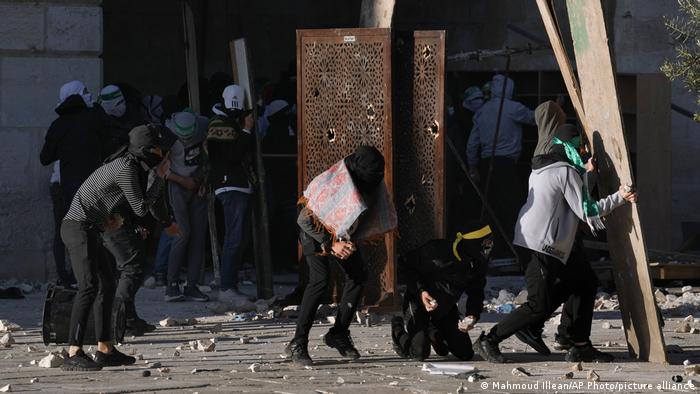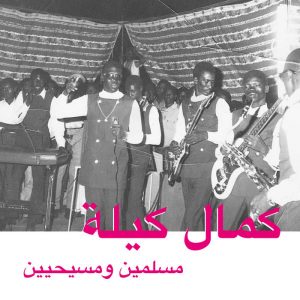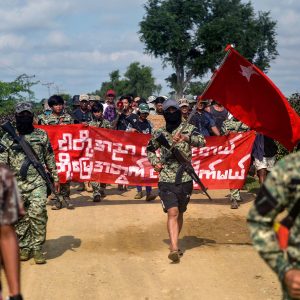On April 17, 2022, there was a historical Abrahamic religion ‘reunion’ as Christians celebrated Easter, Muslims celebrated Ramadan, and Jews celebrated Passover. These three religions all share a common holy site: Jerusalem, as each religion’s founding prophet had some connection to it. So it’s a bit ironic that during this historical weekend, fighting broke out in this holy land, which has led to some fear of another war.
Tensions began this Ramadan (April 3-May 2) when Israeli officials allowed Jewish worshippers into the Al-Aqsa mosque. The Aqsa Mosque is considered a holy site to all three Abrahamic religions, as it is regarded as the center of monotheism due to the multiple prophets who preached there. For Muslims specifically, the Aqsa is the third holiest site after al Kabbah and Al-Masjid an-Nabawi, masjids that Prophet Muhammed is believed to have frequented. Palestinian Muslims are much proud of hosting the third most sacred site globally, and they constantly maintain their presence through the five daily prayers. Their presence is significant during Ramadan, considered the holiest month in the Muslim calendar, as Muslim Palestinians spend the whole month praying and strengthening their religious relationships.
On the other hand, Jewish Israelis believe the Temple Mount, where Al-Aqsa is located, is the holiest site globally, to the point where Jews are asked not to pray on its premises. Hence, a status quo deal was set between both parties, allowing non-Muslims inside during visiting hours, excluding the last ten days of Ramadan (the holiest time of Ramadan for Muslims). Yet within the past few years, more Jews (specifically far-right groups) have been going against the status quo, heeding the cries of the Chief Rabbinate of Jerusalem and Palestinian Muslims.
In response to the far-right groups entering the Aqsa mosque, Palestinian Muslims built stone walls and threw rocks at the soldiers to prevent the Israelis from entering. In response, Israeli soldiers stormed the Al-Aqsa mosque with stun grenades and tear gas as they arrested over 300 Palestinians and injured at least 150 Palestinian worshippers. This attack reignited the fear within the Palestinian community of losing another significant piece of their land to Israel.
Though Israel tried to dismount these fears, the damage was done as hundreds of Palestinians worldwide began to protest against Israeli raids and, subsequently, the Israeli regime. On April 18, 2022, an unknown group from Gaza (rumored to be the Palestinian militant group Islamic Jihad) fired a rocket into Israel during heightened escalations. Hamas, the governing group of Gaza, “reached out to Israel through Egyptian mediators in order to stress that it wasn’t interested in further escalation and had not been behind the attack.” Still, to defend itself, Israel bombed parts of Southern Gaza, leading Hamas to enter the conflict. Attacks were being pursued from both sides, as Israeli and Palestinian civilians feared something similar to 2021’s eleven-day war.
Clashes like this have been common in Israel-Palestine since Israel’s foundation in 1948. Like most Middle Eastern conflicts, these frequent spurs of violence are enrooted within settler colonialism. By displacing millions of Palestinians and killing thousands more, Israel has always proved to be a hostile force to the Palestinian people. Israel continues to justify its approaches by creating new laws that systematically oppress Palestinians but seem straightforward to the naked eye. One particular example was seen in the Sheikh Jarrah uprisings last year.
According to international law and United Nations resolutions, Sheikh Jarrah is illegally occupied by Israel. Additionally, the United Nations has pointed out how difficult it is for Palestinians to get permits to build new homes or renovate their old homes. Israel counters that a small Jewish community lived and owned land in Sheikh Jarrah (among Palestinians) before 1948 but was forced to flee during the Arab-Israeli war. Meanwhile, during the 1950s, thirty Palestinian families were forced out of their homes in various areas around Palestine/Israel and resettled onto the vacant land in Shaikh Jarrah. The Israeli law claims that the descendants of the Jewish families have a right to the land pre-1948. Comparatively, Palestinians or Arab-Israelis aren’t allowed to reclaim their homes or lands owned before the 1948 war in what are now Israeli-majority cities. This discrepancy causes a cycle of confusion as Palestinians continue to be displaced in their own country, making it difficult to safely and securely own their own homes.
Recent years have seen intense violence during religious holidays, especially Muslim holidays, as more than 80% of Palestinians in the West Bank are Muslims. Like most Christian holidays, Muslims visit the mosque during their respective holidays, whether it be Ramadan, Eid el-Fitr, or Eid el-Adha. The largest and holiest mosque in the West Bank is the Al-Aqsa mosque, so naturally, thousands flock over during these times. However, Israeli nationalists also tend to increase their presence in what Palestinians see as a provocative move. Since Palestinians continuously see more of their land annexed (illegally taken) or occupied (Israeli settlements built to push people out legally), they are often anxious about violence in Jerusalem- the capital of both Israel and Palestine.
When Israelis and West Bank Palestinians clash, Gaza Palestinians are also prompted to act. These clashes lead the governing body of Gaza, Hamas, to fire rockets into Israel. Israel then uses the United States’ backed Iron Dome system to defend itself and retaliate by bombing Gazans. These bloody bouts of violence often leave both sides mourning the loss of their loved ones, though one side significantly fares worse in terms of death count, injury count, and loss of homes/jobs.
With all of this conflict surrounding Jerusalem during these ‘holy’ days, it’s imperative to point out that this is not a religious conflict. An interview was an anonymous UC Berkeley Palestinian alumni shows that this is a land issue. When asked whether religion might be behind this conflict, this alumni says “no”:
Religious nerve touched upon leads to escalation, when not allowing dominant religion to practice, they will be mad. [This] goes back to control, [as it is] another site where Palestinians are being controlled, [and] a larger colonial project of limiting access.
Though religion is a large part of the tensions, it is not part of the larger picture: Israel is colonizing Palestine.
As long as no major actions are taken, this cycle of violence will continue. “A spark can not create a fire without adequate fuel.” Yes, these religious-centered clashes will continue, but so will land-related clashes such as the Sheikh Jarrah proceedings. It is up to Israel to find a compromise that will please both: its settlers and the indigenous population of Palestine.
Featured Image Source: AP Photo/Mahmoud Illean






Comments are closed.